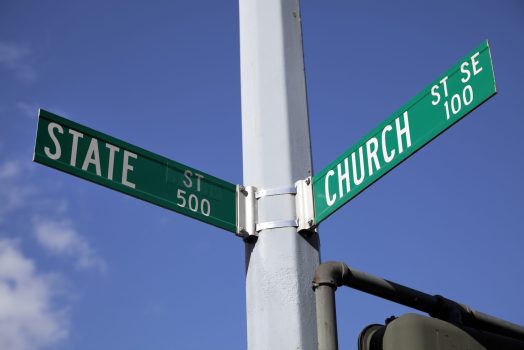
“Ours is a government of limited powers, but debates over the scope of those powers continue.” Every first-year law student reads this line early in their legal education. Chief Justice John Marshall wrote these words in the Supreme Court’s landmark 1819 decision, McCulloch v. Maryland. The issue was whether the new-ish U.S. Congress could create a national (or federal) bank. But the question was one of power. Did our new government have the power to do what it was doing?
We don’t often think about church-state separation as an issue of power, but we should. Do government officials have the power to declare a national day of prayer? Or to tax you to fund a house of worship or religious school? When we think of church-state separation as a limit on government power, we are no longer simply working to stop violations of the Constitution but abuses of power.
When a government official uses the power and resources of a public office to promote their personal religion, they’re abusing that power in a way our founders described as “tyrannical.” No government office has or should have, to borrow from Alexander Hamilton, any “particle of spiritual jurisdiction” or power.
Elected officials might even think of the limitations imposed by church-state separation as an ethics rule. A legislator is an individual that temporarily occupies a government office, and that office is given certain limited powers by the people. That legislator separates the personal from the official all the time. They can’t use a government office to fundraise for their political campaign. They can’t use a government office to promote their personal business and enrich themselves. They can’t take money in exchange for voting a certain way. Each of these not only raises ethical concerns but might also expose the official to criminal or other legal liability. And that’s just the beginning — there are all kinds of important ethical rules that rely on the legal distinction between the person and the office that person temporarily occupies.
For instance, when a football coach at a public school uses the power and influence of the office he temporarily occupies to impose his personal prayer on a captive audience of other people’s children — children who have been entrusted to his care solely because of that position — he has abused that power. He has exercised a power that is not attached to that office in a way that has harmed others and violated their rights.
But doesn’t the coach have religious freedom too? Yes, of course. As private citizens, coaches absolutely have the same religious freedom as anyone else. Go to church. Teach Bible study. Pray and host a prayer circle. But not while you are also wielding the power of the state. Because to do otherwise is to use the machinery of the state to promote your personal religion — and that is an abuse of power.
This hypothetical coach’s personal religious freedom ends where the separation of church and state begins. If you are using the office, the access that office provides, the power of the office, or state resources for your personal religion, you have crossed a line. To borrow from the Big Lebowski, “I’m sorry, Smokey, you were over the line. That’s a foul.”
Accountability for such fouls prevents future abuses of power. When our system checks small abuses of power early on, it prevents more harmful and egregious abuses down the road. And when our system allows those minor abuses, it’s giving a green light for worse. Basic checks — breaks — on abuses of power are a hallmark of healthy democracies. This is a large part of what we mean by “rule of law.” Where there are fewer checks on power, there is a greater tendency toward authoritarianism and fascism. Indeed, the early work of most authoritarian regimes is dismantling these barriers to concentrating their power.
Many of the structural safeguards the framers crafted for our government and constitutional order exist to avoid the concentration of power. For instance, we have three branches of government — legislative, executive, and judiciary — because “concentrating these [powers] in the same hands, is precisely the definition of despotic government,” according to James Madison. Separating powers, pitting powers against each other (state v. federal, House v. Senate), limiting the powers of our government with a written constitution, all of these are basic protections for our democracy.
Church-state separation protects our democracy by limiting the power of government officials over one of the most intimate and cherished elements of our being: our beliefs and affiliation. It also prevents those same officials from weighing in on, if we’re being honest, one of the most historically divisive elements known to human society.
The separation of church and state is the bedrock of our democracy. Defending that separation, which is the work we do every day at Americans United for Separation of Church and State, means defending our democracy.